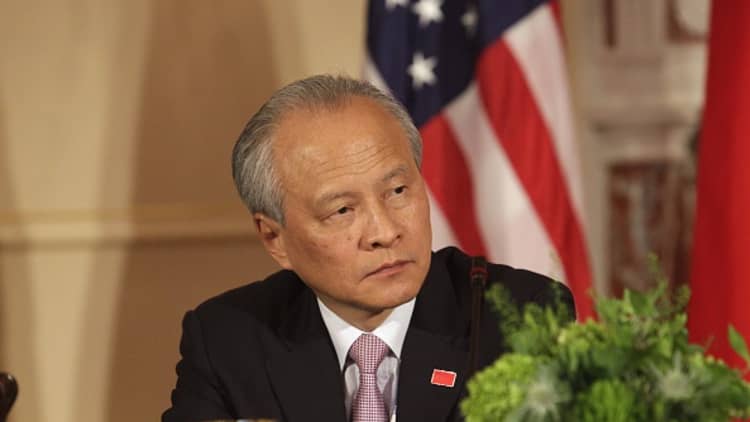
China's ambassador to the United States explained why his country was striking back against U.S. trade measures, as Beijing slapped a new tariff hike on $50 billion worth of American goods.
"We certainly don't want to have any trade war with anybody, but people have to understand who started all this," said ambassador Cui Tiankai.
Speaking ahead of the official announcement, he said China would resort to the World Trade Organization dispute settlement mechanism.
"We'll, in accordance with Chinese laws, take measures to fight back," he said.
Cui's comments come after President Donald Trump's White House unveiled a list Tuesday of Chinese imports the administration proposes to target as part of a crackdown on what the president deems unfair trade practices.
Sectors covered by the White House's proposed tariffs include products used for robotics, information technology, communication technology and aerospace.
On Wednesday morning, Beijing then hit back with additional tariffs on 106 U.S. products. The new charges are targeted at goods including soybeans, cars and whisky. The effective start date for the tariffs is set to be revealed at a later time.
Technology transfers
Officials in Washington and other countries accuse China of unfair trade practices, including a failure to protect intellectual property. An increasingly hot-button issue is Beijing's practice of requiring foreign companies to hand over technological know-how in exchange for access to its domestic market.
Asked by CNBC about those allegations, the ambassador claimed the United States has failed to cite specific instances of when China has forced U.S. firms to hand over technology in order to do business in China.
China has been broadly accused by companies from outside the country of forcing them to undertake "technology transfers" in order to operate there. Beijing also forces many foreign companies into joint ventures with Chinese partners before allowing them access to its market.
A White House official who declined to be named told CNBC that the government is discussing both preparations for potential Chinese retaliation and potential further action from the U.S.
The White House feels that China has to be held to account, the official said, emphasizing that Tuesday's actions were "targeted with a clear message."
The ambassador, however, questioned the efficacy of the U.S. trade approach.
We have done the utmost to avoid this kind of situation, but if the other side makes the wrong choice, then we have no alternative but to fight back.Cui TiankaiChina ambassador to the United States
"Such protectionism will not protect anybody. It will not protect American workers or American farmers. It will not protect American businesses or American consumers," Cui said. "It will hurt everybody including the U.S. economy itself."
The Chinese diplomat said the two economies "are so closely interconnected" that "any unilateral measures will hurt the other side, but the end result would be that it would hurt itself."
"We have done the utmost to avoid this kind of situation, but if the other side makes the wrong choice, then we have no alternative but to fight back," he added.
But even beyond the economic effects to the two countries, Cui warned of a broader fallout from the trade disputes.
"In today's global economy, almost everything is interconnected. So when people take some wrong measures, when people take some protectionist measure, it will hurt people's confidence in the overall prospects for the economy. It may hurt finance, it may hurt trade, it may hurt economic performance, it may hurt consumer confidence — everything," he said.
Still, the ambassador left the door open for a deescalation between the world's two largest economies: "We are always ready to continue and intensify our dialogue and communication with the U.S. side on any possible economic or trade issues, but we need reciprocity. Our goodwill has to be met by the same degree of goodwill."
—CNBC's Eamon Javers contributed to this report.



